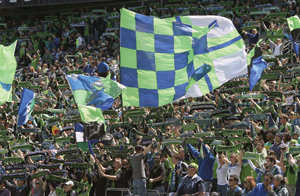Consumer-facing brands invest significant resources to retain loyal customers. Credit cards, hotels, restaurants, auto service shops, even your local hair salon will offer incentives to win your repeat business. Professional sports organizations behave no differently; they want to hang on to fans who spend.
In sports, buying lots of tickets well in advance produces the ultimate loyal customer: the season-ticket holder. Do not overlook the uniqueness of the season-ticket holder’s commitment; few business models encourage people to spend thousands of dollars up front before utilizing the product. It’s not like you give Macy’s $1,000 and decide what merchandise to buy later.
Looking to add value to the season-ticket holder experience, teams pay a lot of attention to the relationship between the customer and the brand. It’s pretty obvious that the relationship between a fan and team differs from that of customer and typical brand. (The world’s biggest Big Mac fans don’t wear McDonald’s jerseys.) The emotion and passion a fan feels for the team drives a different dynamic, one that is always changing, prompting the need for continuous evaluation. Understanding this dynamic facilitates effective communication between team and brand.
 |
The Seattle Sounders FC’s Official Members Association has a say in who the team’s GM is.
Photo by: GETTY IMAGES
|
Perhaps now, the ideal analogy for the fan/team relationship finally exists. Recently while conducting focus groups on behalf of different team clients, I asked respondents to classify their relationship with the teams. My goal was to lay out an emotional spectrum of relationships and to understand where along this spectrum the answer lies. Respondents were offered the following terms by which to describe their relationship: family, friend, colleague, client and customer. Which term stood out as most frequently chosen? None of them. Why? Because the correct answer was not on the list.
Think about the purchases you make on a daily basis. Each time you buy something, you expect something in return. If you are thirsty and buy a soda, you expect the soda to taste good and quench your thirst. Said differently — if you invest in a soda, your return should be refreshment and elimination of thirst.
Return on investment
As season-ticket holders continued lamenting the amounts of money spent without true fulfillment, the light bulb went on. Fans fancy themselves as investors. The money spent on season tickets? An investment. The return on investment? Entertainment. Someone to cheer for. Something to stand behind. Something that provides a sense of identity.
In 1983, psychologist Caryl Rusbult developed the Investment Model of Commitment. Rusbult’s model in its pure form refers to marital relationships, but the principles are easily applied here. Simply explained: Satisfaction, quality of alternatives and investment all factor into commitment, which leads to relationship stability.
Take a typical season-ticket holder. Clearly there exists commitment to the team. What drives that commitment? Firstly, a gratifying experience. A competitive team and good entertainment and customer service often drive gratification. Secondly, a lack of alternatives suggests greater likelihood of loyalty. To be sure, competition exists for a season-ticket holder’s discretionary income; fewer alternatives mean less competition.
Thirdly, investment level plays a huge role in commitment. Think about the investment. While many season-ticket holders qualify as affluent, they still acknowledge and realize the size of the investment. Beyond money, time spent at the game and in travel, cost of parking, and schedule accommodations all represent investment. Then consider the pure emotional investment. The cheering, hoping and praying. They are all in. In exchange for their actions, they want equal and opposite reactions.
When someone invests in a public company, the investor becomes entitled to privileges such as a proxy vote, shareholder meeting, and of course an annual report with a lot of behind-the-scenes information about how the company is run and why key decisions are made. I don’t foresee or recommend teams using fan proxy votes for decision-making, and a meeting for all season-ticket holders seems impractical. But why can’t a team issue an annual report to its season-ticket holder base? Season-ticket holders clamor for more communication, and not just any communication: VIP-level communication. A report summarizing key milestones, important team transactions (on and off the field or court), and certain financial performance metrics would be a terrific step toward treating season-ticket holders like investors. Note my emphasis on certain financial metrics: Teams are privately owned and obviously retain the right to keep certain information behind closed doors.
Of course, teams try to satisfy their portion of the commitment by trying to field a competitive team, including perks and benefits, and offering pricing discounts for buying in advance. How else can a sports property add value? Certain teams have already made strides to be more communicative with season-ticket holders. For instance, the Golden State Warriors provided a contract to their season-ticket holders that guaranteed various performance goals in 2011-12 in exchange for risk-free renewal. The Seattle Sounders FC has created an Official Members Association that, among other things, will allow fans to vote on whether to retain general manager Adrian Hanauer following the 2012 season. In an effort to be a customer-centric organization, the Philadelphia Eagles maintain a 35-person season-ticket-holder advisory board that meets monthly; they provide input and feedback regarding the organization’s business practices.
Everyone wants to root for a team that has a chance every time out. Season-ticket holders invest in more than a team, or an organization. They invest in a brand. Their return on their investment will never be measured in dollars, but rather in emotional metrics and willingness to invest again. By helping ensure balance on both sides of the relationship, the team only helps add to that return.
Steve Seiferheld (steveseiferheld@turnkeyse.com) heads the custom research division of Turnkey Intelligence.





